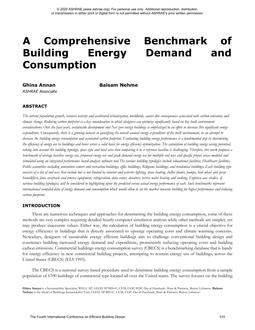
A Comprehensive Benchmark of Building Energy Demand and Consumption
- Comments Off on A Comprehensive Benchmark of Building Energy Demand and Consumption
- ASHRAE
Click here to purchase
The current population growth, resource scarcity and accelerated urbanization, worldwide, causes dire consequences associated with carbon emissions andclimate change. Reducing carbon footprint is a key consideration in which designers can optimize significantly based on key built environmentconsiderations. Over the past years, sustainable development and Net zero energy buildings is emphasized in an effort to decrease this significant energyexpenditure. Consequently, there is a growing interest in quatifying the overall annual energy expenditure of the built environment, in an attempt todecrease the building energy consumption and associated carbon footprint. Evaluating building energy performance is a fundemantal step in determiningthe efficiency of energy use in buildings and hence serves a solid basis for energy efficiency optimization. The calculation of building energy saving potential,taking into account the building typology, space type and total area then comparing it to a reference baseline is challenging. Therefore, this work proposes abenchmark of average baseline energy use, proposed energy use and peak demand energy use for multiple end uses and specific project areas modeled andsimulated using an integrated performance based analysis software tool.The various building typologies include educational facilities, Healthcare facilities,Public assemblies including convention centers and recreation buildings, office buildings, Religious buildings, and residential buildings. Each building typeconsists of a list of end uses that include but is not limited to; interior and exterior lighting, space heating, chiller plants, pumps, heat wheel and sprayhumidifiers, fans, receptacle and process equipment, refrigeration, data center, elevators, service water heating and cooking. Eighteen case studies, ofvarious building typologies, will be considered in highlighting upon the predicted versus actual energy performance of each. Such benchmarks representinternational compiled data of energy demand and consumption which would allow to set the market towards building for higher performance and reducingcarbon footprint.
Citation: 4th Intl Conf: Efficient Bldg Design
Product Details
- Published:
- 2020
- Number of Pages:
- 9
- Units of Measure:
- Dual
- File Size:
- 1 file , 2.3 MB
- Product Code(s):
- D-ICEB20-37

